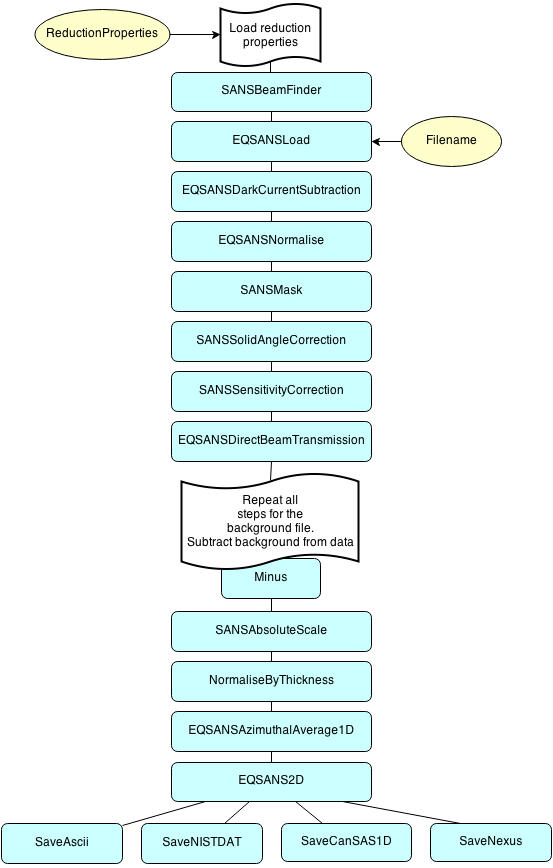\(\renewcommand\AA{\unicode{x212B}}\)
SANSReduction v1
Basic SANS reduction workflow
| Name |
Direction |
Type |
Default |
Description |
|---|
| Filename |
Input |
string |
|
List of input file paths |
| ReductionProperties |
Input |
string |
__sans_reduction_properties |
Property manager name for the reduction |
| OutputWorkspace |
Input |
string |
|
Reduced workspace |
| OutputMessage |
Output |
string |
|
Output message |
Executes the SANS reduction workflow according to the options set by
SetupEQSANSReduction.
Those options are saved in a PropertyManager object that is passed through ReductionProperties.
The workflow proceeds as follows:
- Execute the beam finder algorithm. Usually SANSBeamFinder.
- Load the data to be reduced, usually with EQSANSLoad,
which will move the detector to the right position.
- Subtract the dark current, usually with EQSANSDarkCurrentSubtraction.
- Normalize the data, usually with EQSANSNormalise.
- Mask detector pixels as appropriate, usually with SANSMask.
- Apply the solid angle correction, usually with SANSSolidAngleCorrection.
- Apply the sensitivity correction, usually with SANSSensitivityCorrection.
When applicable, a separate beam center position can be determined for the sensitivity data.
- Compute and apply the transmission correction, usually with EQSANSDirectBeamTransmission.
When applicable, a separate beam center position can be determined for the transmission data.
- Repeat steps 2 to 8 for the background run, then subtract the background from the sample data.
- Perform the absolute scaling, usually with SANSAbsoluteScale.
- Perform any geometrical correction, which is usually a call to NormaliseByThickness.
- Perform the I(Q) calculation with EQSANSAzimuthalAverage1D.
- Perform the I(Qx,Qy) calculation with EQSANSQ2D.
- Save the I(Q) output using SaveAscii
and using SaveCanSAS1D.
- Save the I(Qx,Qy) output using SaveNISTDAT
and SaveNexus.

Categories: AlgorithmIndex | Workflow\SANS\UsesPropertyManager
